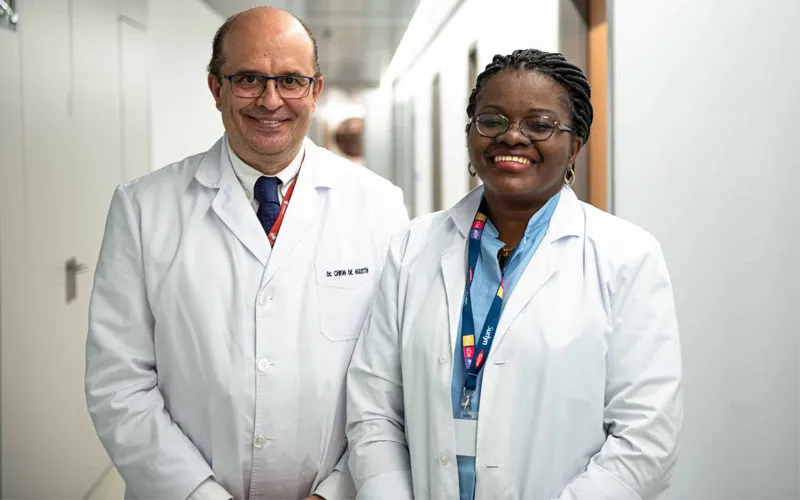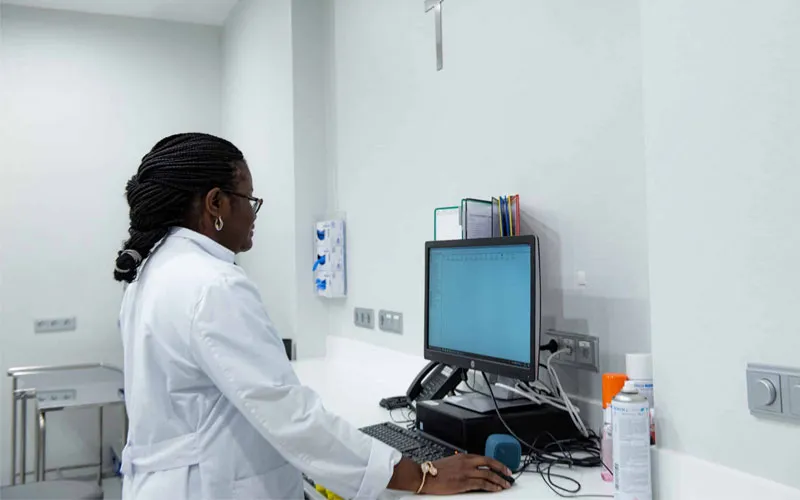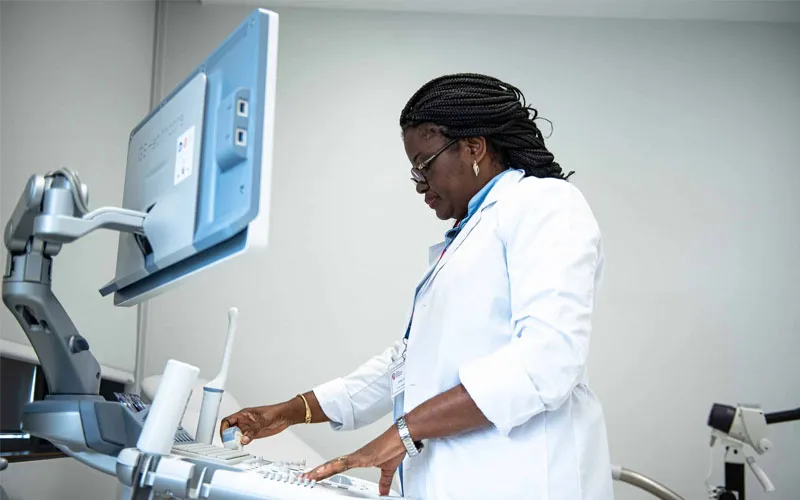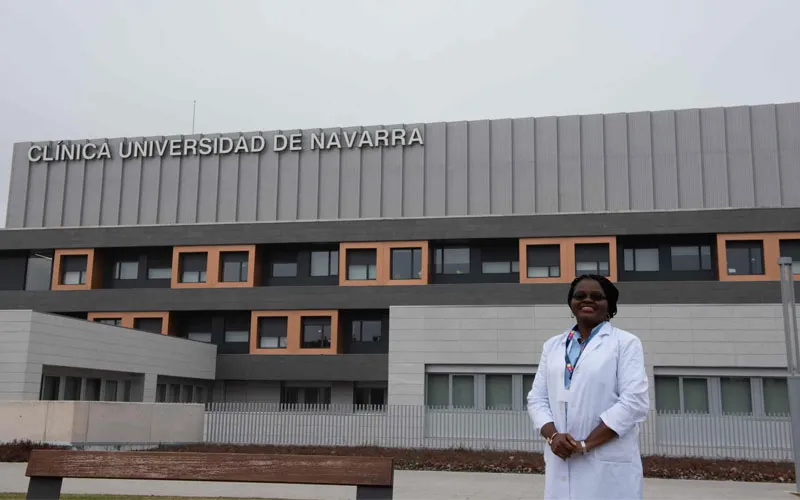She said that she is discovering more than what she expected by working with one of the most prominent cancer researchers in the world.
“I am learning and discovering much more than I expected. How to improve my detection of the alterations in the cervix with colposcopy with the teachers, to read the biopsies of the diseased cells and to be able to also help those who come with a very advanced disease as more or less as it is done here,” she said.
The Congolese medical researcher added, “As for molecular biology for the detection of the virus, we cannot do it yet in my country. Maybe manually. Yes, but it costs a lot of money.”
Although DRC is ranked 175 out of the 189 countries on Human Development Index (HDI) as per the World Bank, Dr. Tendobi says she was able to receive a good education.
Her father was an economist and worked at the National Bank while her mother, an entrepreneur, started with a shoe store, then went on to sell other items, so she and her siblings were able to go to good schools and university.
(Story continues below)
“My parents were good Christians, and they educated us in Christian values, telling us that we had to study well to be able to work properly to help the people of our country, always living Christian charity, something difficult in the Congo where almost everyone is very distrustful, and it is not understood, as in Europe, to do favors, for friendship and for being family,” Dr. Tendobi told HAI.
 Credit: Harambee Africa International
Credit: Harambee Africa International
She said that her inspiration to pursue medicine came from a deep desire to help others, especially sick people, who she says are the neediest, adding, “From a Christian point of view, we see Christ who suffers through the sick people close to us.”
The Congolese researcher said that education is still a luxury to some people in the DRC, especially those living in rural areas where she says girls are married off early.
“Rural areas of my country are very isolated and it is very difficult for them to communicate with the cities. People have not been educated and they stick to old traditions. They don't understand why, nor why a girl has to go to school, when what she will do all her life is to till the land, do housework and fetch water. They see their daughters as ‘merchandise to be sold’. The sooner they marry her off, the sooner they will receive the dowry. They do not see her as a child or even as a human being with the same dignity, to be educated and respected. All this changes when people are educated,” Dr. Tendobi narrated.
She lauded efforts by HAI to create awareness on educating girls among African communities, saying, “What Harambee Africa is doing, to provide education, to ensure that many more girls can go to school, that many girls learn a profession with which to help their family without having to marry, that many adult women learn to read and write and that some, like me, can broaden our studies and our professional horizons, is commendable.”
The medic explained that the HAI Guadalupe Scholarship is “a dream come true” and an invaluable opportunity to train with the best in the world medical field.
She said that with the knowledge gained outside her country, she will be able to train her team at the Monkole Hospital in Kinshasa and combine efforts to reach as many women as possible facing the cancer threat.
“Now I have a small office for cervical screening with two people: a nurse and an assistant. I want to reach many more women. I lack the means for this goal,” she shared.
The HAI scholarships program has been established in honor of Guadalupe Ortiz de Landázuri, a celebrated researcher who has been described as “a doctor in chemical sciences and humanity...and in holiness as well.”
Dr. Tendobi testified that knowing about famed scientists was like “discovering a hidden treasure.”
“The truth is that I knew the name ‘Guadalupe Ortiz de Landázuri’ before the scientist was beatified because there was a biography in my house. When it was announced that she was going to be beatified, I read it with interest and it was like discovering a hidden treasure, to see how a person can achieve holiness in everyday life, exercising her profession,” she said, and added, “Above all, I was impressed by the confidence she had in her surroundings and in St. Josemaría, and the fact that she was always happy.”
“Blessed Guadalupe or ‘Ya Guada’ as we call her in my country, is for me an older sister who touched my hand and taught me where to go, how to organize myself, and what to do in life. She is for me a role model, a source of inspiration, a demonstration that science and truth also lead you to God,” the doctor said.
Asked to define the research situation in the Congo compared to that of other countries in sub-Saharan Africa and to that of the West, the scientist said, “It is clear that the situation in the West is not comparable to that in sub-Saharan Africa.”
She said that unlike in the West where there are many trained people in various areas of the medical fields, DRC was experiencing a massive shortage of medical experts.
She said that many trained African scientists who benefited from scholarships to study abroad have refused to go back to their home countries.
Dr. Tendobi does not blame African researchers who have abandoned their home countries. She says, “I understand this, because if in your country you do not find the opportunities you need to develop your career, it is logical to look for them abroad. But I am sure that with the number of well-trained Congolese abroad, we could be the best in sub-Saharan Africa.”
 Credit: Harambee Africa International
Credit: Harambee Africa International
She says that although DRC is known for the ongoing guerrilla war and Ebola, there are many positive stories about the African country.
“My country is like a paradise on Earth,” she says, and explains, “It is full of natural wealth. There is a large and powerful river. There are minerals including coltan for the manufacture of cell phones, diamonds, gold, copper, oil and natural gas.”
She adds, “There is everything. This is our wealth and our great misfortune because everybody wants to get hold of these treasures and in the end the law of the strongest or the richest wins, which is never the Congolese.”
According to the medical doctor, behind the ongoing war in DRC is a political and “a power struggle to get the coltan.”
“I also believe that Ebola is used to discourage good people from coming to my country. If it has been eliminated in all countries, why not in Congo,” the Congolese medical doctor says.
She adds, “I hope that everything will change someday because we have the human resources that are the most important, millions of young people who only need to be well trained to be able to build a future for themselves in their country.”
Agnes Aineah is a Kenyan journalist with a background in digital and newspaper reporting. She holds a Master of Arts in Digital Journalism from the Aga Khan University, Graduate School of Media and Communications and a Bachelor's Degree in Linguistics, Media and Communications from Kenya's Moi University. Agnes currently serves as a journalist for ACI Africa.
 Dr. Celine Tendobi. Credit: Harambee Africa International
Dr. Celine Tendobi. Credit: Harambee Africa International




 Credit: Harambee Africa International
Credit: Harambee Africa International Credit: Harambee Africa International
Credit: Harambee Africa International


